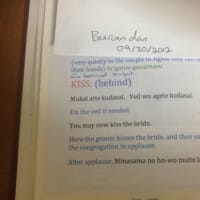A Guide To Potter-isms: Wizardspeak In Translation
ポッター・イズムへの招待:魔法の言葉の意味
ハリーポッターでの表現が、日常語として使われるようになった。
言葉は常に時代とともに変化する。
Categories: Movies, Books
12:01 am
July 15, 2011

Warner Bros Pictures
If you don't know who this fellow is (that's Ralph Fiennes playing him), you can find out in the Harry Potter vocabulary below. He's the really (really) bad guy.
もし、あなたがこの男を知らないなら(ラルフ・フィネスが演じている)、下記のハリーポッター・ボキャブラリーに答えがあります。 彼は本当に悪い奴です。
Ben Zimmer runs the web site Visual Thesaurus, which maps words and their relationships to each other. On Friday's Morning Edition, he talks with host Mary Louise Kelly about the special vocabulary that's arisen from Harry Potter books and films — the last of which, Harry Potter And The Deathly Hallows Part 2, opens this weekend. He compiled this quick guide to Potterisms.
ベン・ジマーは様々な単語と他の単語の関係を地図のようにつなぐ、ヴィジュアル・セソーラスのウェッブサイトを運営している。金曜日のモーニング・エディションで、彼はホスト役のメリー・ルイズ・ケリーとハリーポッターの本と映画から生まれた特別なボキャブラリー(語彙)について話している。 最後にハリーポッターとデスリー・ハロウズ・パート2が今週末に公開する。彼はポタリズム(ハリーポッター用語)に簡単な解説をしている。
1. Muggles and other blood types マグルと他の血液型
Muggle is the Potterism that has crossed over the most into everyday usage (it even has an entry in the Oxford English Dictionary). From the original meaning, "a person who possesses no magical powers," it's been extended to mean "a person who lacks particular skills" — for instance, used by computer hackers to describe non-hackers. You can also call someone who doesn't understand you or annoys you a muggle.
マグルとは日常の会話に最もよく耳にするポタリズムである。(オクスフォード・イングリッシュ・ディクショナリーにも既に載っている。) 元々の意味は「魔法の力を持っていない人」で、そこから「ある技術を欠いている人」と言う意味で使われる。例えばコンピューターのハッカー仲間ではハッカーでない人のことを指して言う。また、あなたを理解してくれない人、或いは迷惑な人のこともマグルと言う。
Beyond muggle, some similar terms from the Harry Potter universe are pureblood (a magical person with no Muggle blood), squib (a non-magical person born into a magical family), mudblood (a magical person born into a Muggle family), and halfblood (a magical person with one Muggle-born parent).
マグル関連でハリーポッターの世界から似たような言葉を拾ってみると
ピュアブラッド (マグルの血を持たない魔法使い)
スクイッブ (魔法使いの家族に生まれた魔法の使えない子)
マッドブラッド (マグルの家族に生まれた魔法使い)
ハーフブラッド (片親がマグルの家庭に生まれた魔法使い)
2. Character names キャラクター(登場人物)の名前
Lord Voldemort: The name of Harry Potter's archenemy can be used to refer to someone supremely diabolical. Since the wizards are afraid of summoning him, he is also known as He Who Must Not Be Named, which comes in handy in everyday life as well to refer to someone who should be kept out of the conversation. (I know a woman who refers to her ex-husband as He Who Must Not Be Named, and her sisters sometimes just call him Voldemort.)
ヴォルデモート卿: ハリーポッターの大敵の名前で、誰かとても不愉快な人のことを言うのに使われる。 魔法使い達が、彼が召集されるのを恐れるところから、彼は「名前を挙げてはいけない人」として使われる。日常生活で、会話の中で触れてはいけない人のことに言及して良く使われる。(私が知っている例では、ある女性が前の夫のことを名前を聞くのも嫌だということで、彼女の姉妹がしばしば、彼のことをヴォルデモートと呼んでいた。)
Other character names can be extended to real-life people who share certain key characteristics with their Potter equivalents. So a Dumbledore is a wise and courageous mentor, a Snape is a cruel teacher, a Hermione is a bright young overachiever, and a Draco is an evil bully.
登場人物の他のキャラクターも特徴が似たような実在の人を指して使われることがある。
例えば
ダンブルドアは賢くて、勇気のある相談相手、
スネイプは厳しい教師、
ハーミオンは頑張り屋、
ドラコは陰険な苛めっ子など。
3. Spells and other magic 呪文(おまじない)と他の魔法
On Harry Potter message boards, fans admit that they sometimes try out the incantations from the Harry Potter books in the hopes that they'll work in real life. For instance, Accio! (ACK-ee-oh) is the "summoning charm," which could be said if you're too lazy to reach for something. Expecto Patronum! is the spell that conjures your soul's protector (Patronus), an incarnation of your positive feelings that wards off dementors (see below). These Latin imperatives are best said in a crisp British accent.
ハリーポッターの掲示板には、ファンが時々、現実の世界でも魔法が効くことを期待して、ハリーポッターの本から引用した呪文を使っていることを認めている。例えば、アッキーオ(Accio!)は魔力を呼び寄せるおまじないで、例えば自分が何かにあと一歩で努力が足りない時に使える。 エクスペクト・パトローナム!(Expecto Patronum!)はあなたの魂を護るものを連想させる呪文(パトロナス)、あなたの前向きの感情の化身で悪魔を払い除ける。 これらのラテン語の命令は英国式アクセントで歯切れよくしゃべるのがコツ。
Apparition is a form of teleportation: a magical person can disapparate (disappear) from one place and apparate (reappear) elsewhere. Harry Potter fans often wish they could apparate in real life, though they would need to avoid splinching (becoming physically split between a former location and a new one).
Other magical terms include horcrux (an item of dark magic that holds a piece of soul, used to attain immortality). There are also many magical creatures, like thestrals (winged horses that appear to those who have witnessed death), boggarts (shape-shifters that take on the form of the victim's worst fear), and dementors (soul-sucking fiends). A Harry Potter fan might feel beset by such creatures (metaphorically speaking!).
アパリションはテレポーテーション(瞬間移動)のこと:魔法使いはディサパレート(消える)ある場所から消えてアパレート(再現出)どこかに現れることができる。ハリーポッターのファンは、しばしば現実にどこかに出現したいと願っているが、スプリンチングは避ける必要がある。 スプリンチングとは(瞬間移動前の場所と、移動後の場所に体が引き裂かれること。)
他の魔法用語として、ホークラックス(魂のかけらを入れる闇魔術のアイテムで、悪徳を手に入れるのに用いる)がある。 また魔法の生き物も沢山ある、例えばセストラル(死を目撃した人に現れる、翼のある馬)、ボガート(犠牲者の最悪の恐怖心を形で表す変幻自在な魔物)、そしてデメンター(魂を吸い取る悪霊)。 ハリーポッターのファンはそのような魔物に取り囲まれているように感じているのかもしれない。(比喩的に言って)
4. Phrases フレーズ
Phrases from the books and movies seep into the conversation of Harry Potter fans. They might say "Merlin's beard!" or "Gulping gargoyles!" when surprised. "Send me an owl" is a request for communication, since owls deliver messages in the Potter universe, such as invitations to attend Hogwarts, the magic school. If you're anticipating an invitation, you could be "waiting for your Hogwarts letter." When being mischievous, two useful phrases are "I solemnly swear I am up to no good" (an incantation used to make a blank parchment turn into the "Marauder's map") and "mischief managed" (said when finished using the Marauder's map). The point system used to reward and punish the Hogwarts Houses also comes in handy, as in "10 points to Gryffindor!" (or "from Gryffindor" for a punishment).
また、本や映画の中のフレーズはハリーポッターファンの会話の中に浸透している。彼らは驚いた時には「メルリンズ・ビアド(顎ひげ)」や「グルッピング ガーゴイル」などと言うし、「センド・ミー・オウル(ふくろうを送れ)」は連絡の要求を意味する。なぜかというとポッターの世界ではふくろうがメッセージを運ぶからだ。例えば魔法の学校であるホッグワートへの招待状など。 もし、あなたが招待状を期待しているならば、こう言えばいい「あなたのホッグワートレターを待っている。」 いたずらするときには、次の二つのフレーズが有効だ「私は謹んで誓う、私は良くないことを企んでいる。」(これは何も書かれていない卒業証書を略奪者の地図に変える呪文)そして、「いたずらは成し遂げられた」(略奪者の地図をつかって、いたずらが終わった時に言うフレーズ) ホグワート・ハウス(魔法の学校)で10点満点で、褒めたり、罰したりするシステムは便利だ。 「10ポイント グリフィンドール!」(または「グリフィンドールから罰点」)
5. Artifacts of the Potter universe ハリーポッターの創りもの
More committed fans may try to bring the Potter universe into real life by importing certain artifacts. They might hold Quidditch matches (one was held last year in Central Park). Or they might exchange recipes for Butterbeer (a popular wizarding beverage).
もっと凝ったファンは、ポッターの世界の創りものを現実の世界に取り込んでいる。かれらはクイデッチ試合を開催するだろうし(実際にセントラルパークで開催した連中がいる。)、バタービールのレシピを交換している。(バタービールとは物語の中で人気の魔法の飲み物である。)
6. Britishisms ブリティッシュイズム(英国風)
American fans might find themselves repeating the British words and expressions found in the Harry Potter books and movies (though the terms aren't specific to Rowling's work). Some words that are particularly appealing are derogatory epithets (prat, git, dunderhead) and rude interjections (sod off, bloody hell, blimey). Another Britishism from the series is ickle, a baby-talk form of 'little."
アメリカのファンはハリーポッターの本や映画で使われる英国の言葉や表現を沢山使っている。(その用語はローリングの作品に限った表現ではないが) とくにアピールする幾つかの言葉は軽蔑的な悪口(プラット、ギット、ダンダーヘッド)と乱暴な感嘆語(ソッド オフ、ブラディ ヘル、ブリメイ)など。 ほかの、ポッターシリーズからの英国風表現はイックルという小さい(リトル)の幼児語がある。
ポッター・イズムへの招待:魔法の言葉の意味
ハリーポッターでの表現が、日常語として使われるようになった。
言葉は常に時代とともに変化する。
Categories: Movies, Books
12:01 am
July 15, 2011

Warner Bros Pictures
If you don't know who this fellow is (that's Ralph Fiennes playing him), you can find out in the Harry Potter vocabulary below. He's the really (really) bad guy.
もし、あなたがこの男を知らないなら(ラルフ・フィネスが演じている)、下記のハリーポッター・ボキャブラリーに答えがあります。 彼は本当に悪い奴です。
Ben Zimmer runs the web site Visual Thesaurus, which maps words and their relationships to each other. On Friday's Morning Edition, he talks with host Mary Louise Kelly about the special vocabulary that's arisen from Harry Potter books and films — the last of which, Harry Potter And The Deathly Hallows Part 2, opens this weekend. He compiled this quick guide to Potterisms.
ベン・ジマーは様々な単語と他の単語の関係を地図のようにつなぐ、ヴィジュアル・セソーラスのウェッブサイトを運営している。金曜日のモーニング・エディションで、彼はホスト役のメリー・ルイズ・ケリーとハリーポッターの本と映画から生まれた特別なボキャブラリー(語彙)について話している。 最後にハリーポッターとデスリー・ハロウズ・パート2が今週末に公開する。彼はポタリズム(ハリーポッター用語)に簡単な解説をしている。
1. Muggles and other blood types マグルと他の血液型
Muggle is the Potterism that has crossed over the most into everyday usage (it even has an entry in the Oxford English Dictionary). From the original meaning, "a person who possesses no magical powers," it's been extended to mean "a person who lacks particular skills" — for instance, used by computer hackers to describe non-hackers. You can also call someone who doesn't understand you or annoys you a muggle.
マグルとは日常の会話に最もよく耳にするポタリズムである。(オクスフォード・イングリッシュ・ディクショナリーにも既に載っている。) 元々の意味は「魔法の力を持っていない人」で、そこから「ある技術を欠いている人」と言う意味で使われる。例えばコンピューターのハッカー仲間ではハッカーでない人のことを指して言う。また、あなたを理解してくれない人、或いは迷惑な人のこともマグルと言う。
Beyond muggle, some similar terms from the Harry Potter universe are pureblood (a magical person with no Muggle blood), squib (a non-magical person born into a magical family), mudblood (a magical person born into a Muggle family), and halfblood (a magical person with one Muggle-born parent).
マグル関連でハリーポッターの世界から似たような言葉を拾ってみると
ピュアブラッド (マグルの血を持たない魔法使い)
スクイッブ (魔法使いの家族に生まれた魔法の使えない子)
マッドブラッド (マグルの家族に生まれた魔法使い)
ハーフブラッド (片親がマグルの家庭に生まれた魔法使い)
2. Character names キャラクター(登場人物)の名前
Lord Voldemort: The name of Harry Potter's archenemy can be used to refer to someone supremely diabolical. Since the wizards are afraid of summoning him, he is also known as He Who Must Not Be Named, which comes in handy in everyday life as well to refer to someone who should be kept out of the conversation. (I know a woman who refers to her ex-husband as He Who Must Not Be Named, and her sisters sometimes just call him Voldemort.)
ヴォルデモート卿: ハリーポッターの大敵の名前で、誰かとても不愉快な人のことを言うのに使われる。 魔法使い達が、彼が召集されるのを恐れるところから、彼は「名前を挙げてはいけない人」として使われる。日常生活で、会話の中で触れてはいけない人のことに言及して良く使われる。(私が知っている例では、ある女性が前の夫のことを名前を聞くのも嫌だということで、彼女の姉妹がしばしば、彼のことをヴォルデモートと呼んでいた。)
Other character names can be extended to real-life people who share certain key characteristics with their Potter equivalents. So a Dumbledore is a wise and courageous mentor, a Snape is a cruel teacher, a Hermione is a bright young overachiever, and a Draco is an evil bully.
登場人物の他のキャラクターも特徴が似たような実在の人を指して使われることがある。
例えば
ダンブルドアは賢くて、勇気のある相談相手、
スネイプは厳しい教師、
ハーミオンは頑張り屋、
ドラコは陰険な苛めっ子など。
3. Spells and other magic 呪文(おまじない)と他の魔法
On Harry Potter message boards, fans admit that they sometimes try out the incantations from the Harry Potter books in the hopes that they'll work in real life. For instance, Accio! (ACK-ee-oh) is the "summoning charm," which could be said if you're too lazy to reach for something. Expecto Patronum! is the spell that conjures your soul's protector (Patronus), an incarnation of your positive feelings that wards off dementors (see below). These Latin imperatives are best said in a crisp British accent.
ハリーポッターの掲示板には、ファンが時々、現実の世界でも魔法が効くことを期待して、ハリーポッターの本から引用した呪文を使っていることを認めている。例えば、アッキーオ(Accio!)は魔力を呼び寄せるおまじないで、例えば自分が何かにあと一歩で努力が足りない時に使える。 エクスペクト・パトローナム!(Expecto Patronum!)はあなたの魂を護るものを連想させる呪文(パトロナス)、あなたの前向きの感情の化身で悪魔を払い除ける。 これらのラテン語の命令は英国式アクセントで歯切れよくしゃべるのがコツ。
Apparition is a form of teleportation: a magical person can disapparate (disappear) from one place and apparate (reappear) elsewhere. Harry Potter fans often wish they could apparate in real life, though they would need to avoid splinching (becoming physically split between a former location and a new one).
Other magical terms include horcrux (an item of dark magic that holds a piece of soul, used to attain immortality). There are also many magical creatures, like thestrals (winged horses that appear to those who have witnessed death), boggarts (shape-shifters that take on the form of the victim's worst fear), and dementors (soul-sucking fiends). A Harry Potter fan might feel beset by such creatures (metaphorically speaking!).
アパリションはテレポーテーション(瞬間移動)のこと:魔法使いはディサパレート(消える)ある場所から消えてアパレート(再現出)どこかに現れることができる。ハリーポッターのファンは、しばしば現実にどこかに出現したいと願っているが、スプリンチングは避ける必要がある。 スプリンチングとは(瞬間移動前の場所と、移動後の場所に体が引き裂かれること。)
他の魔法用語として、ホークラックス(魂のかけらを入れる闇魔術のアイテムで、悪徳を手に入れるのに用いる)がある。 また魔法の生き物も沢山ある、例えばセストラル(死を目撃した人に現れる、翼のある馬)、ボガート(犠牲者の最悪の恐怖心を形で表す変幻自在な魔物)、そしてデメンター(魂を吸い取る悪霊)。 ハリーポッターのファンはそのような魔物に取り囲まれているように感じているのかもしれない。(比喩的に言って)
4. Phrases フレーズ
Phrases from the books and movies seep into the conversation of Harry Potter fans. They might say "Merlin's beard!" or "Gulping gargoyles!" when surprised. "Send me an owl" is a request for communication, since owls deliver messages in the Potter universe, such as invitations to attend Hogwarts, the magic school. If you're anticipating an invitation, you could be "waiting for your Hogwarts letter." When being mischievous, two useful phrases are "I solemnly swear I am up to no good" (an incantation used to make a blank parchment turn into the "Marauder's map") and "mischief managed" (said when finished using the Marauder's map). The point system used to reward and punish the Hogwarts Houses also comes in handy, as in "10 points to Gryffindor!" (or "from Gryffindor" for a punishment).
また、本や映画の中のフレーズはハリーポッターファンの会話の中に浸透している。彼らは驚いた時には「メルリンズ・ビアド(顎ひげ)」や「グルッピング ガーゴイル」などと言うし、「センド・ミー・オウル(ふくろうを送れ)」は連絡の要求を意味する。なぜかというとポッターの世界ではふくろうがメッセージを運ぶからだ。例えば魔法の学校であるホッグワートへの招待状など。 もし、あなたが招待状を期待しているならば、こう言えばいい「あなたのホッグワートレターを待っている。」 いたずらするときには、次の二つのフレーズが有効だ「私は謹んで誓う、私は良くないことを企んでいる。」(これは何も書かれていない卒業証書を略奪者の地図に変える呪文)そして、「いたずらは成し遂げられた」(略奪者の地図をつかって、いたずらが終わった時に言うフレーズ) ホグワート・ハウス(魔法の学校)で10点満点で、褒めたり、罰したりするシステムは便利だ。 「10ポイント グリフィンドール!」(または「グリフィンドールから罰点」)
5. Artifacts of the Potter universe ハリーポッターの創りもの
More committed fans may try to bring the Potter universe into real life by importing certain artifacts. They might hold Quidditch matches (one was held last year in Central Park). Or they might exchange recipes for Butterbeer (a popular wizarding beverage).
もっと凝ったファンは、ポッターの世界の創りものを現実の世界に取り込んでいる。かれらはクイデッチ試合を開催するだろうし(実際にセントラルパークで開催した連中がいる。)、バタービールのレシピを交換している。(バタービールとは物語の中で人気の魔法の飲み物である。)
6. Britishisms ブリティッシュイズム(英国風)
American fans might find themselves repeating the British words and expressions found in the Harry Potter books and movies (though the terms aren't specific to Rowling's work). Some words that are particularly appealing are derogatory epithets (prat, git, dunderhead) and rude interjections (sod off, bloody hell, blimey). Another Britishism from the series is ickle, a baby-talk form of 'little."
アメリカのファンはハリーポッターの本や映画で使われる英国の言葉や表現を沢山使っている。(その用語はローリングの作品に限った表現ではないが) とくにアピールする幾つかの言葉は軽蔑的な悪口(プラット、ギット、ダンダーヘッド)と乱暴な感嘆語(ソッド オフ、ブラディ ヘル、ブリメイ)など。 ほかの、ポッターシリーズからの英国風表現はイックルという小さい(リトル)の幼児語がある。




















※コメント投稿者のブログIDはブログ作成者のみに通知されます